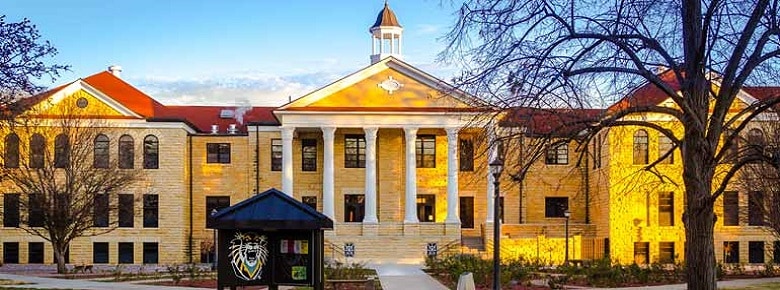Do you want to go to college but are interested in multiple subjects? Earning an online bachelor’s in interdisciplinary studies degree may be the right answer for you.

Editorial Listing ShortCode:
If you’re serious about going to college but don’t want to tie yourself down to one specific major, online interdisciplinary studies degree programs may be the way to go. These interdisciplinary majors can provide a unique and broad education that can help you pursue a variety of jobs in many different fields.
Online Interdisciplinary Studies Degrees

An interdisciplinary studies degree, or multidisciplinary studies degree, is often a great choice for those not set on taking one specific major. Contrary to what you may think, it is not for people who don’t know what they want to do in life.
If you have a couple of different interests and don’t want to narrow them down but still have very clear career goals for your future, an interdisciplinary studies major may be a great choice. You may also want to earn an interdisciplinary degree if your college offers several classes in your area of interest but doesn’t offer a degree in that area.
Because an interdisciplinary degree covers so many different subject areas, everything from political science to visual arts to environmental studies, it can help you get a very well-rounded and balanced education.
This degree may also provide you with more control over your college education because interdisciplinary programs tend to be less rigid than many other programs. You’ll likely work closely with an advisor to select interdisciplinary studies major courses you’re interested in and that should still allow you to earn a true bachelor’s degree.

In many ways, an interdisciplinary studies degree is like a liberal arts degree. You will most likely have to follow the same core curriculum as you would in a liberal studies degree program. These typically include classes such as English, literature, history, biology, art, and various math courses. Beyond this core curriculum, though, you should be able to select a wide and diverse array of classes that hold your interest.
An interdisciplinary studies major isn’t for slackers and can actually be quite intense. For an advisor to sign off on an interdisciplinary degree, you usually have to prove to them how your selected classes can help you achieve your life and career goals. It takes someone with a clear, concise vision of his or her future and assertive nature to do well.
Editorial Listing ShortCode:
Because interdisciplinary studies degrees can contain such a wide variety of different courses, you could potentially earn a Bachelor of Arts (B.A.) or Bachelor of Science (B.S.) in Interdisciplinary Studies.
The potential interdisciplinary studies jobs are also numerous and varied. For instance, with an interdisciplinary studies major, you could potentially become a web developer, financial advisor, recruiter, game warden, journalist, copywriter, small business owner, paralegal, and so much more.
Interdisciplinary Studies Curriculum & Courses

Because you have so much personal control over your curriculum in an interdisciplinary studies program, the classes you take could be very different from the classes someone else takes with an interdisciplinary studies major. Some of your core classes will likely be similar, though.
These are some common classes in a bachelor’s in interdisciplinary studies programs.
- English Composition: In this class, students write. They typically do a lot of reading as well, but mostly, students in this class write everything from journal entries to creative stories to research papers.
- College Algebra: This class covers basic algebraic concepts. Depending on your specific focus, you may be allowed to stop here, or you might be required to take higher-level math courses.
- Fundamentals of Public Speaking: In this course, students learn to write speeches and develop presentations. Typically, these are presented to classmates after they are written.
- Introduction to Theater: This class is an overview of everything that goes into putting on a theatrical performance, including set design, casting, and stage blocking.
- Fundamentals of Computer Programming: This is an introductory computer programming course. It typically covers basic programming languages and how to use them.
- Macroeconomics: This class covers large-scale economics and commerce.
- Philosophy and Critical Thinking: This class is a study of common philosophical problems and the solutions that have been posited by philosophers across the world.
- World Geography: This course teaches about the geography of the world, including landmasses and oceans.
- Technical Writing: This is another writing course, but its focus is on professional writing. This class typically has a strong emphasis on proofreading, editing, and writing reports.
- Spanish I: This course can help you learn the basics of the Spanish language.
These are just a few examples of the core curriculum you may have to take in an interdisciplinary studies program.
Interdisciplinary Studies Careers & Salaries

The jobs you may be eligible for after earning your interdisciplinary studies degree are almost as numerous and varied as the courses you could choose to take. There are job opportunities in many different fields with this degree.
Editorial Listing ShortCode:
According to the U.S. Bureau of Labor Statistics, these are some of the career interests that can be pursued with this degree:
| Careers | Annual Median Salary |
| Sales Managers | $132,290 |
| Human Resources Managers | $121,220 |
| Personal Financial Advisors | $89,330 |
| Web Developers and Digital Designers | $77,200 |
| Technical Writers | $74,650 |
| Middle School Teachers | $60,810 |
| Game Wardens | $58,040 |
| Paralegals and Legal Assistants | $52,920 |
| Physical Therapists Assistants and Aides | $49,970 |
| News Analysts, Reporters, and Journalists | $49,300 |
As you can see, the potential career fields you might work in after earning this degree are many and varied. The average pay for many of these positions is also quite good and typically anywhere from slightly above to way over the average annual salary for American workers, which according to the BLS is about $41,950 a year.

It’s true that the above-listed jobs may be achieved with a bachelor’s degree in interdisciplinary studies. For some of them, such as if you decide to become a middle school teacher or a physical therapist assistant, you might also be required to pass specific exams or obtain specific certifications as well.
That is why it’s so important to have a clear vision of what you want your future career to be. With a clear vision, you can tailor your classes to get the maximum amount of knowledge and skills for your desired career.
Plus, if you know ahead of time that you want to be, for instance, a teacher, you can begin planning early for the exam and certification parts of the degree process.
Choosing an Online Interdisciplinary Studies Degree

When it comes time to select a school for your undergraduate degree, it’s important you select the right one. You can help ensure this by outlining your educational needs beforehand and then comparing the different schools you’re interested in attending to see which one best fulfills those needs.
Editorial Listing ShortCode:
Here are some of the things you may want to consider when picking out your school.
- Course selection: It’s important to have some type of plan about your future before selecting a school. This will you ensure that the school you choose has the types of classes you need for your interdisciplinary studies degree.
- Cost of attendance: Your total cost of attendance includes the college’s tuition, any additional fees, and the cost of books and other supplies. Most of these costs should be outlined on your prospective college’s website. This information can help you determine the schools that fit your budget.
- Transfer credit policy: If you’ve attended college before, you want to ensure your new college will accept your transfer credits and/or degree. This can help you save time and money by not having to retake classes you’ve already successfully completed.
- Campus requirements: Although many online programs are 100% online and never require you to step foot on campus, some aren’t. You can check your prospective program’s website or talk with admissions counselors to find out if it has any on-campus requirements. If it does, you can check the required dates to determine whether they fit into your schedule.
Other things to consider are how the online program is set up (e.g. work at your own pace vs. scheduled deadlines and online meetings), the teacher-to-student ratio, and how long the program takes to complete.
Admissions Requirements

While the admissions requirements at the bachelor’s level might not be as stringent as those of a graduate program, there will still be some requirements. It is important to make sure you meet these requirements so that the enrollment process can go more quickly and easily.
Specific admissions requirements vary from school to school, but there are a few that are typically standard no matter where you apply.
- Completed application: A completed application is often the first step to enrolling in any college. They are standard and usually ask for basic information about you and your educational history.
- SAT/ACT scores: Many schools no longer require you to have certain ACT/SAT scores for acceptance, but some still do. Whether a certain score is required or not, most schools will still ask for your scores because it can help them place you in classes according to your academic performance.
- Official transcripts: Colleges want a complete picture of your academic history. This includes high school and previous colleges. You can request transcripts from the guidance counselor or registrar at your previous schools.
- Admissions fee or waiver: Some colleges will require you to pay a fee before they’ll even look at your application. If this presents a genuine financial hardship for you, most schools will let you submit an official fee waiver or request through the admissions office.
While these are some of the most basic admissions requirements, they aren’t the only requirements you might have. Some schools require personal essays. Others require letters of recommendation from people who know you professionally or academically.
Editorial Listing ShortCode:
If you’re ever in doubt as to what a school’s admissions requirements are, you can visit its website. Most, if not all, have an admissions tab that outlines admissions requirements for both new freshmen students and student transfers. You can also call the admissions department at the school.
Pros and Cons of Getting an Interdisciplinary Studies Degree Online

Earning your interdisciplinary or multidisciplinary studies degree online has some serious advantages, but there are also a few downsides as well. Here we’ve compiled a list of some of the biggest pros and cons of online interdisciplinary studies degrees:
Pros:
- They typically have a ton of flexibility, including the option to double major.
- They are often great for people with full-time jobs, parental responsibilities, or other time-consuming commitments.
- You can save a lot of money on transportation.
- There are no room and board fees.
- You’ll likely have exposure to new technology and computer applications, which may greatly enhance your computer skills.
- It can help you develop self-discipline.
- Completion of an online program can demonstrate to employers that you’re self-motivated and responsible.
- It may allow you to work at your own pace in your own home.
- There’s often a broader course selection online.

Cons:
- Tuition can sometimes be more expensive.
- You will have to be much more self-disciplined and independently focused.
- Working from home may be full of distractions.
- There’s typically less social interaction, and you may have no face-to-face contact with your peers or your teacher.
- Some online programs lack accreditation, so you’ll need to check carefully before enrolling.
Although there are a few disadvantages to online programs, the pros outweigh the cons for many students. It’s important that you weigh the pros and cons for yourself before deciding on an online program, though. You know yourself better than anyone and are the best one to make the decision.
Accreditation

Online programs sometimes get a bad rap because people think they aren’t as legitimate as on-campus programs. That simply isn’t true. As long as your college—online or on-campus—has regional accreditation, it’s a legitimate college.
Colleges can receive regional accreditation from one of seven regional accreditation agencies in the United States. Having this accreditation means that the colleges have met the strict and high standards set by the Council for Higher Education Accreditation.
Editorial Listing ShortCode:
What that means for you is that your credits are more likely to be transferable to other U.S. schools, and your degree will be more recognized by potential employers.
You can check the accreditation status of a school by visiting its official website. If it isn’t listed on the site, you can also search for the school on the Department of Education’s Database of Accredited Postsecondary Institutions and Programs and check its accreditation status that way.
Financial Aid & Scholarships

At the undergraduate interdisciplinary studies majors level, one of the most popular forms of financial aid is the Federal Pell Grant. The Pell Grant is money given to undergraduate students at accredited postsecondary institutions who fall within a certain income range and meet certain other criteria. It doesn’t have to repaid unless it is wrongfully received or misused.
You can apply for the Federal Pell Grant by filling out the Free Application for Federal Student Aid (FAFSA).
Filling out the FAFSA is also how you apply for student loans from the federal government. Those, too, are awarded based solely on income and eligibility requirements and have nothing to do with GPA or test scores. Unlike the Pell Grant, though, the loans do have to be repaid. You can also apply for loans through outside, non-government loan institutions and banks.
Scholarships are another popular financial aid option for interdisciplinary studies majors. School-specific scholarships may be found on your school’s official website. Other scholarships may be found from local or community organizations, through your employer, or online.
There are many scholarships out there for students at the undergraduate level, and it can be helpful to apply for as many as you can.

What Jobs Can You Get with an Interdisciplinary Studies Degree?
One of the best things about interdisciplinary studies programs is that they can help open the door to so many different job opportunities. Some of these require no extra certifications or exams. Others may require you to pass an exam or meet licensing requirements.
Editorial Listing ShortCode:
Students with this degree often become teachers, paralegals, game wardens, journalists, copywriters, technical writers, web developers, financial advisors, human resources managers, recruiters, entrepreneurs, office managers, administrative assistants, and more. This is a very diverse field with plenty of career options.
Is an Interdisciplinary Studies Degree Good?

Whether this degree is good depends on your own personal career goals. There are certainly some advantages. For one, it can help you obtain a very broad, multifaceted education in many different subjects, which in turn may lead to a wide variety of different career interests.
If you have a set career path that would benefit from taking a specific major, such as business administration, social work, or human resources, you might prefer to take that dedicated major instead. Taking a dedicated major can help you get the most information on that specific subject rather than some knowledge in a wide variety of fields.
In some cases, in an interdisciplinary studies program, there are options to double major.
Can You Teach with an Interdisciplinary Studies Degree?
You may be able to teach with an interdisciplinary studies degree, but you’ll still have to meet the specific requirements of your state to become a licensed teacher. Once you’ve met those requirements, you may teach at the elementary, middle school, and/or high school levels with an interdisciplinary studies degree.
What Are Examples of Interdisciplinary Studies?

Interdisciplinary studies is a degree program where you have a lot of control over the classes you take, so the possibilities are numerous. One example includes interdisciplinary studies in American studies.
For this degree, you’d likely take several classes focused on American literature, the history of America, and American politics and economics. Other examples include African American Studies and Gender Studies.
Editorial Listing ShortCode:
You may also mix two subjects together and study them both in interdisciplinary studies majors. This might include something like Culinary Arts and Engineering, Journalism and Sociology, Wildlife Studies and Technology, or Computer Science and Business Administration.
What Are Interdisciplinary Studies in College?
Interdisciplinary studies programs are student-centered degrees that can allow you to take control over the classes you take to earn your bachelor’s degree. You can create a unique curriculum not offered by your college to work towards a certain career path.
As for the core classes, it’s similar to a liberal arts degree. Beyond that, you get to make the decisions as to what classes you take. You may focus on one area of study or combine two areas and pursue them both.
What Requirements Are Needed to Graduate with a Bachelor of Arts in Interdisciplinary Studies?

The requirements for graduating with a B.A. in Interdisciplinary Studies will differ slightly depending on the college. Generally, you must meet all the core educational requirements for a Bachelor of Arts degree and complete a set amount of credit hours in one or two specific areas of study.
You may also have to take a few classes specific to people majoring in interdisciplinary studies. The degree will likely require you to complete 120 credit hours to graduate.
Why Should I Choose a Bachelor’s in Interdisciplinary Studies Degree Major?
If you want to design your own curriculum or study two different fields simultaneously, interdisciplinary studies programs may be the right path for you.
If you’re interested in a field that isn’t offered by your college as a specific major, an interdisciplinary studies degree may also be the way to take the most classes in that particular area of interest and still earn a bachelor’s degree.
What Can I Do with My Bachelor of Science in Interdisciplinary Studies Degree?
A B.S. in Interdisciplinary Studies can help prepare you for numerous different graduate school programs if you’re interested in furthering your education.
Editorial Listing ShortCode:
Additionally, it may give you access to many different interdisciplinary studies jobs. You might become a computer programmer, network analyst, financial consultant, IT tech, web developer, web designer, and more.
Universities Offering Interdisciplinary Studies Bachelor’s Degree Programs
Methodology: The following school list is in alphabetical order. To be included, a college or university must be regionally accredited and offer degree programs online or in a hybrid format.

Arizona State University is not just a public school powerhouse. It has also been a center of economic development since its opening in 1886. Students at ASU utilize the latest in technology, research, and innovation to work towards one of the many doctoral, graduate, or undergraduate degrees the school offers.
- BA in Interdisciplinary Studies
- BA in Interdisciplinary Studies – Organizational Studies
Arizona State University is accredited by the Higher Learning Committee.

Offering a solid education for adults since 1911, East Tennessee State University is one of the largest public universities in TN. It is home to several colleges, including one of the most prestigious colleges of medicine in the nation.
Offering an assortment of undergraduate, graduate, and doctoral programs, ETSU strives to excel in student success.
- BS in Interdisciplinary Studies
East Tennessee State University is accredited by the Southern Association of Colleges and Schools Commission on Colleges.

Emporia State University does more than just provide public education. They also help their graduates find career placement in their fields of study or enter into advanced programs of study.
Since its start in 1863, Emporia State University has worked to bring communities together. Today, it does so with its dynamic student interactive program that provides social experiences to all who seek them. ESU offers both undergraduate and graduate programs.
- Bachelor of Interdisciplinary Studies
Emporia State is accredited by the Higher Learning Commission.

Florida International University opened in 1965. Offering online and in-class course opportunities, one of its goals is to help students access higher education from anywhere in the world. FIU has undergraduate, graduate, and doctoral programs that encourage learners to excel in their careers and become lifelong learners.
Popular programs include Information Technology, Education, Law, and Medicine.
- BA in Interdisciplinary Studies
Florida International University is accredited by the Southern Association of Colleges and Schools Commission on Colleges.

Fort Hays State University is a public educational institute that has been giving students access to higher learning since 1902. The undergraduate and graduate degree programs at Fort Hays combine practical experiences with content awareness to help students achieve success in their careers.
Distance learning opportunities give more students the ability to attend FHSU.
- Bachelor of General Studies
Fort Hays State University is regionally accredited by the Higher Learning Commission.

Opened in 1906, Georgia Southern University provides public education to students from across the US and 85 nations around the world. With more than 140 fields of study, GSU gives students individual tracks to earn bachelor’s, master’s, and doctoral degrees.
This large academy gives a small-town sense to those who are looking for a blend of both worlds.
- Bachelor of Interdisciplinary Studies
Georgia Southern University is accredited by the Commission on Southern Association of Colleges and Schools Commission on Colleges.

Located on a beautiful campus that is surrounded by trails and lakes, Governors State University has been helping students find their way since 1969. GSU accepts students looking to begin new 4 year degrees and those who want to transfer in. Either option gives students access to more than 50 bachelor’s, master’s, and doctoral programs in online and on-campus formats.
- BA in Interdisciplinary Studies
Governors State University is accredited by the Higher Learning Commission.

Opened in 1877, Jackson State University is a public university that is rich in history and culture. JSU has more than 8,000 students a year seeking undergrad, master’s, and doctoral degrees. JSU takes pride in the individual attention it gives to every student.
- BS in Professional Interdisciplinary Studies
Jackson State University is accredited by the Commission on Colleges of the Southern Association of Colleges and Schools.

Liberty University has a firm belief in the betterment of the mind, the community, and the world. Opened in 1771, it was one of the first private schools to open in the US. This faith-based organization awards associate, bachelor’s, and graduate programs to students all over the world.
- BS in Interdisciplinary Studies
In addition to their online BS degree, Liberty also offers a Masters in Interdisciplinary Studies online program.
Liberty University is accredited by the Southern Association of Colleges and Schools Commission on Colleges.

Many students looking for flexible options for gaining higher education look toward Midway University. Midway University is a private, liberal arts college that has programs for associate, bachelor’s, and graduate degrees.
Midway began in 1847 as a small academy and has not stopped growing. It now offers traditional and accelerated degrees to students throughout the world.
- BA in Interdisciplinary Studies
Midway University is accredited by the Southern Association of Colleges and Schools Commission on Colleges.

Founded in 1878, Mississippi State University strives to reach students around the globe. It offers undergraduate, graduate, and doctoral programs in a variety of academic fields. Its programs are grounded in hands-on research and innovative technology.
As a public education institute, the cost of MSU is competitive and affordable.
- BS in Interdisciplinary Studies
Mississippi State University is accredited by the Southern Association of Colleges and Schools Commission on Colleges.

Sitting between New Orleans and Baton Rouge is a historical site that has housed Nicholls State University since 1948. With more than 100 bachelor’s and master’s degree programs, Nicholls State University strives to help traditional and nontraditional students meet their learning goals.
Affordable public education for all students is the backbone of NSU.
- Bachelor of Interdisciplinary Studies
Nicholls State University is accredited by the Southern Association of Colleges and Schools Commission on Colleges.

In 1819, Norwich University began offering a public postsecondary education based on military practices. Today, it offers a variety of undergraduate and graduate degree programs and professional certificate programs.
Known as the place where ROTC was born, NU helps develop leaders through academics.
- Bachelor of Interdisciplinary Studies
Norwich University is accredited by the New England Commission of Higher Education.

Created in 1873 as a public academic facility, Southeast Missouri State University has grown into an international school with bachelor’s, master’s, and doctoral options for learners in a plethora of degree fields.
SMSU gives students access to distance education, hybrid classes, and traditional classroom learning. Research and technology are the roots of all its programs.
- BS in Interdisciplinary Studies
Southeast Missouri State University is accredited by the Higher Learning Commission.

Stevenson University is a private college in Baltimore County, Maryland, that began in 1947. Students looking to gain a nationally recognized degree often explore Steven University’s many pre-professional, bachelor’s degree, and graduate degree programs. Scholars who partake in the SU experience can gain a rigorous education that can help them become civic-minded leaders.
- BS in Interdisciplinary Studies
Stevenson University is accredited by Middle States Commission on Higher Education.

The University of Alabama has been educating individuals with world-class learning techniques since 1820. Students attending this public university have access to research facilities and programs where they can learn to thrive and develop inside and outside the classroom.
With numerous undergraduate and graduate degree programs, the University of Alabama strives to have something for everyone.
- BA in Interdisciplinary Studies
- BS in Interdisciplinary Studies
The University of Alabama is accredited by the Southern Association of Colleges and Schools Commission on Colleges.

The University of Arkansas has a multitude of flexible undergraduate, graduate, and doctoral degree programs to help students build the knowledge needed to thrive in their future careers. This public facility has been rated high among scholars since its beginning in 1871. Notable past professors at the University of Alabama include Hillary and Bill Clinton.
- BA in Interdisciplinary Studies
The University of Arkansas is accredited by the Higher Learning Commission.

Exploring space and building machines has been an interest at the University of Central Florida since it began in 1963. Research and innovation are built into every undergraduate, graduate, and doctoral degree offered at this public university.
It is globally recognized for excellence, and its distance learning opportunities help pave the way for future generations.
- BA in Interdisciplinary Studies
- BS in Interdisciplinary Studies
The University of Central Florida is accredited by the Southern Association of Colleges and Schools Commission on Colleges.

Since its start in 1908, the University of Nebraska—Omaha has expanded across much of the state of Nebraska to help thousands of students reach their educational potential. As a public university, the University of Nebraska—Omaha helps students attain graduate and undergraduate degrees at an affordable price.
Each program provides hands-on learning experiences for its diverse student body.
- Bachelor of Multidisciplinary Studies
UNO is accredited by the Higher Learning Commission.

The University of Texas—El Paso provides research-directed education that leads to bachelor’s, graduate, and doctoral degrees in a variety of interdisciplinary majors. This public school originated in 1914 and now serves a diverse student body in a global capacity with on-campus and virtual programs.
- Bachelor of Multidisciplinary Studies
The University of Texas at El Paso is accredited by the Southern Association of Colleges and Schools Commission on Colleges.

The University of Virginia is a public flagship university that was founded by Thomas Jefferson in 1819.
With all levels of degree programs stretching from undergraduate to doctoral, the University of Virginia has countless opportunities to help learners expand their knowledge and become global civic-minded leaders who will pave the way for others to follow.
- Bachelor of Interdisciplinary Studies
The University of Virginia is accredited by the Commission on Colleges of the Southern Association of Colleges and Schools.

West Texas A&M University has been serving Texas publicly since 1910. Today, they have expanded to several campus locations and offer an extensive online program.
Representing students from around the globe, West Texas A&M University helps a diverse population receive undergraduate and graduate degrees in an array of different academic fields.
- Bachelor of General Studies
West Texas A&M University is accredited by the Southern Association of Colleges and Schools Commission on Colleges.

Originally opened under a different name, West Virginia University began in 1867 as a public land-grant research university. Campus-based and online courses are offered in more than 300 different areas of study and provide a way for students to earn undergraduate and graduate degrees.
Notable alumni from WVU include astronauts, mathematicians, and political leaders.
- Bachelor of Multidisciplinary Studies
West Virginia University is accredited by the Higher Learning Commission.

Opened in 1906, Western Kentucky University is an essential aspect of the Kentucky economy. WKU trains thousands of students annually in career-focused areas that lead to bachelor and graduate degrees.
Some of the study areas reflected in WKU’s programs are business, education, engineering, and health services. WKU also offers studies in historic preservation.
- Bachelor of Interdisciplinary Studies
Western Kentucky University is accredited by the Southern Association of Colleges and Schools Commission on Colleges.

Wichita State University started in 1865 and is now home to thousands of students looking to gain undergraduate, graduate, or doctoral degrees from one of the six colleges throughout the university.
This public university is among the top of its field in research academia and distance learning programs (U.S. News & World Report). Popular programs include studies in technology, education, science, and the arts.
- Bachelor of General Studies
Wichita State is accredited by the Higher Learning Commission of the North Central Association of Colleges and Schools.
Getting Your Interdisciplinary Studies Degree Online

If your college offers many classes in a subject you’re interested in studying but doesn’t offer a major in that field, interdisciplinary studies may be the perfect solution. If you can’t decide between two different fields and want to study them both, interdisciplinary studies may be the answer to that problem too.
An online interdisciplinary studies degree can give you a great amount of control by allowing you to design your own degree program and select the classes you take and the things you learn in your college experience. This can include everything from political science to visual arts to environmental studies.
Working on this degree from home also offers you a lot of flexibility and is less likely to interfere with your full-time job and other responsibilities.
The right college for you is out there, and if the right degree program isn’t, an interdisciplinary studies program can help you create your own.

